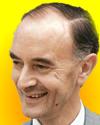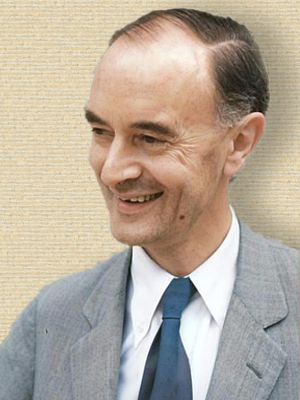 (source)
(source)
|
Christopher Kelk Ingold
(28 Oct 1893 - 8 Dec 1970)
English chemist whose research on reaction mechanisms in chemical reactions and the electronic structure of organic compounds introduced such terms as nucleophile, electrophile, inductive and resonance effects, and the symbolic descriptions SN1, SN2, E1, E2.
|
Science Quotes by Christopher Kelk Ingold (4 quotes)
[Flürscheim] was good at unanswerable arguments.
— Christopher Kelk Ingold
Obituary for Flürscheim, Journal of the Chemical Society, 1956, 1087.
Reagents are regarded as acting by virtue of a constitutional affinity either for electrons or for nuclei... the terms electrophilic (electron-seeking) and nucleophilic (nucleus-seeking) are suggested... and the organic molecule, in the activation necessary for reaction, is therefore required to develop at the seat of attack either a high or low electron density as the case may be.
— Christopher Kelk Ingold
'Significance of Tautomerism and of the Reactions of Aromatic Compounds in the Electronic Theory of Organic Relations', Journal of the Chemical Society (1933), 136, 1121, fn.
Since it is proposed to regard chemical reactions as electrical transactions in which reagents act by reason of a constitutional affinity either for electrons or for atomic nuclei, it is important to be able to recognize which type of reactivity any given reagent exhibits.
— Christopher Kelk Ingold
'Principles of an Electronic Theory of Organic Reactions', Chemical Reviews (1934), 15, 265.
You ask whether I am going over to the history of science... no, I am not as old as that.
— Christopher Kelk Ingold
Said on his retirement c.1969.
See also:
- 28 Oct - short biography, births, deaths and events on date of Ingold's birth.

 In science it often happens that scientists say, 'You know that's a really good argument; my position is mistaken,' and then they would actually change their minds and you never hear that old view from them again. They really do it. It doesn't happen as often as it should, because scientists are human and change is sometimes painful. But it happens every day. I cannot recall the last time something like that happened in politics or religion.
(1987) --
In science it often happens that scientists say, 'You know that's a really good argument; my position is mistaken,' and then they would actually change their minds and you never hear that old view from them again. They really do it. It doesn't happen as often as it should, because scientists are human and change is sometimes painful. But it happens every day. I cannot recall the last time something like that happened in politics or religion.
(1987) -- 


